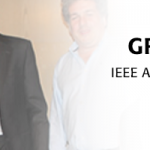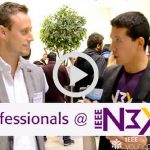2021 IEEE president-elects | IEEE Entrepreneurship Asks the Questions
IEEE Entrepreneurship asked the 2021 IEEE president-elects three questions to assist our entrepreneurial ecosystem in understanding their choices.
- Why do you think entrepreneurs are important to IEEE?
- What experiences have you had in your career with entrepreneurship, intrapreneurship, innovation, etc.?
- How would you, as IEEE President, support entrepreneurs?
IEEE’s 2021 Presidential Candidates, in which the order was pre-determined using a number generator, Saifur Rahman (Nominated by Petition), S.K. Ramesh (Nominated by IEEE Board of Directors), and K. J. Ray Liu (Nominated by IEEE Board of Directors) comment on how their respective candidacies will support entrepreneurs.
- The views and opinions expressed in this blog are those of each candidate and do not necessarily reflect the position of IEEE Entrepreneurship.
Saifur Rahman’s message to the IEEE Entrepreneurship community:
 From my long experience in teaching and keeping track of many former students who have entered the workforce and done well, I have seen two kinds of entrepreneurs. The first type is one who is entrepreneurial (and usually innovative) from a young age, maybe from a high school level. When this young person starts college they discover wide-open opportunities because college gives them a much broader view of life and access to information. They take advantage of these and build something marketable. Founders of Microsoft, Apple, Facebook, and Google are some of the shining examples.
From my long experience in teaching and keeping track of many former students who have entered the workforce and done well, I have seen two kinds of entrepreneurs. The first type is one who is entrepreneurial (and usually innovative) from a young age, maybe from a high school level. When this young person starts college they discover wide-open opportunities because college gives them a much broader view of life and access to information. They take advantage of these and build something marketable. Founders of Microsoft, Apple, Facebook, and Google are some of the shining examples.
In the second group (larger) are students who have a hidden entrepreneurial spirit but risk-averse. With proper coaching and mentoring, some of them can be successful entrepreneurs. This is where IEEE can play a role. The IEEE Entrepreneurship community can be organized on university campuses like the IEEE Student Branches. The IEEE Entrepreneurship Products/Services survey shows that two-thirds or more of the respondents considered these to be important – mentoring from entrepreneurial leaders, mentoring from investors, IP advice at a lower cost, entrepreneurial workshops, and access to legal expert advice at a lower cost. There are intellectual property lawyers, angel investors, and successful entrepreneurs who may be invited to campus events and encouraged to provide some pro bono services to help entrepreneurs on college campuses. These activities can help IEEE not only to find entrepreneurs but also to help them succeed. For IEEE to grow and succeed globally, the organization needs to be relevant to the student and the working technologists worldwide. The IEEE entrepreneurship program could be one such way to do this.
My own experience
I have set up a start-up company BEM Controls LLC which provides an open architecture software platform to monitor and control a range of IoT devices for building automation, power management, and so on. This is considered an academic research start-up. The origin was a government-funded research project at my university.
As IEEE president I can support entrepreneurs in various ways
I will look for opportunities to link these groups at local levels, university campuses, and IEEE sections/chapters which will help them to attract speakers, resource persons, and corporate support. I will try to reach out to these groups either personally during my visits to various IEEE sections, or virtually through townhall type meetings.
S.K. Ramesh’s message to the IEEE Entrepreneurship community:
 A few weeks ago, I received an invitation from the IEEE-SIGHT group to give a talk on the “Future of Engineering in the post-COVID era”. I accepted it right away but took poetic license with their suggested title and changed it to “Engineering the Future in the post-COVID era”. Today, we are witnessing an extraordinary test of the human spirit as we combat the global pandemic. Our world has changed, forever! IEEE’s mission of “Advancing Technology for Humanity” has never been more relevant.
A few weeks ago, I received an invitation from the IEEE-SIGHT group to give a talk on the “Future of Engineering in the post-COVID era”. I accepted it right away but took poetic license with their suggested title and changed it to “Engineering the Future in the post-COVID era”. Today, we are witnessing an extraordinary test of the human spirit as we combat the global pandemic. Our world has changed, forever! IEEE’s mission of “Advancing Technology for Humanity” has never been more relevant.
Technologies are changing. Challenges are evolving. Our members’ experience has changed.
We need to adapt and change to serve our members effectively. Indeed, there has never been a better time to be part of IEEE Entrepreneurship community. Innovation will be the driver of human success as I have learned from the virtual town halls that I have hosted recently.
It is reaffirming to see that 60 % of the respondents to the IEEE Entrepreneurship survey have an idea that focuses on Industry, Innovation, and Infrastructure (UNSDG #9). In my career as an engineering educator in the California State University system, I have established programs and centers to build an entrepreneurial ecosystem focusing on renewable energy, assistive technology, and advanced manufacturing. I led the steering committee to establish a satellite incubator at CSU Northridge in 2011 involving alumni, students, and faculty. The LA Cleantech Incubator initiative (LACI) attracts and promotes startups in clean technologies. By 2014, LACI companies created over 700 jobs and $ 60 Million in revenues. Projects like Ecoponex resulted from the collaboration. On a broader scale, I lead the Engineering area delegation on ABET and firmly believe that programs need to be outward focused entrepreneurial engines of innovation.
Personally, my IEEE experiences of almost four decades have taught me some timeless values: To be Inclusive, Collaborative, Accountable, Resilient, and Ethical. Simply put, “I CARE”. I see these values as intrinsic to our future where the IEEE Entrepreneurship community comes together with resilience – innovating in the face of adversity, with an urgency fueled by the passion and commitment to make a difference for a bright and sustainable future for humanity. That is the power of IEEE. Trusted, Diverse, and Inclusive, – We are in a great position to “Engineer the Future”. It would be an honor and a privilege to serve you and bring this vision to fruition. Please visit https://rameshsk.com for additional information. Thank you!
K.J. Ray Liu’s message to the IEEE Entrepreneurship community:
 Long gone are the days when a technologist can count on lifelong employment with a single company. Also gone are the mega-research labs – the innovation paradigm in the industry has shifted to hundreds/thousands of garage/basement start-ups. They are now the engines driving the technological revolution. Most of the entrepreneurs are energetic professionals pursuing their dreams of changing the world.
Long gone are the days when a technologist can count on lifelong employment with a single company. Also gone are the mega-research labs – the innovation paradigm in the industry has shifted to hundreds/thousands of garage/basement start-ups. They are now the engines driving the technological revolution. Most of the entrepreneurs are energetic professionals pursuing their dreams of changing the world.
Every IEEE member should develop entrepreneurial skills for their self-survival, and experienced entrepreneurs are the best role models.
I have been a founder of three start-ups. I started a company in 1997 to develop the world’s first digital surveillance system at a time all the security systems are analog. I co-founded a company in 2002 on smart antenna chipset design later sold to Broadcom. Now I am the founder of a company pioneering wireless AI for which I won the prestigious 2017 CEATEC Grand Prix and 2020 CES Innovation Award with a product available in over 150 countries worldwide. As such, I was elected as a fellow of the National Academy of Inventors.
Entrepreneurship is in my blood/DNA. When I was a member of the IEEE Board of Directors outreach to industry, I heard from everywhere that start-ups need more support from IEEE. Indeed, entrepreneurship is now a worldwide phenomenon. But where is IEEE, asked them? IEEE has not been present or visible in the entrepreneurial world until a few years ago when we started the Entrepreneurship program. After several years of endeavors by good hands, we are starting to see some success.
Last year, I was Vice President, Technical Activates, the home of IEEE Entrepreneurship. I appointed an ad hoc committee to create the “Powered by IEEE” program by consolidating/revising/creating products/services to meet the demands of start-ups. It has been integrated into the IEEE Entrepreneurship program. Because of worldwide demands, our services/products must be scalable to be able to make an impact anywhere, anytime.
As the President of IEEE, entrepreneurship will be a top priority of my strategic plan. We will continue to build the IEEE Entrepreneurship ecosystem to bring researchers/technologists/venture angels/marketers together, and create products/services that could provide value to such an ecosystem to support and make a real impact on start-ups. I aim to build and grow IEEE Entrepreneurship program to a significant IEEE operating unit and establish its leadership role with a real impact on the world of entrepreneurs and start-ups, where the breakthroughs and innovations are taking place.






